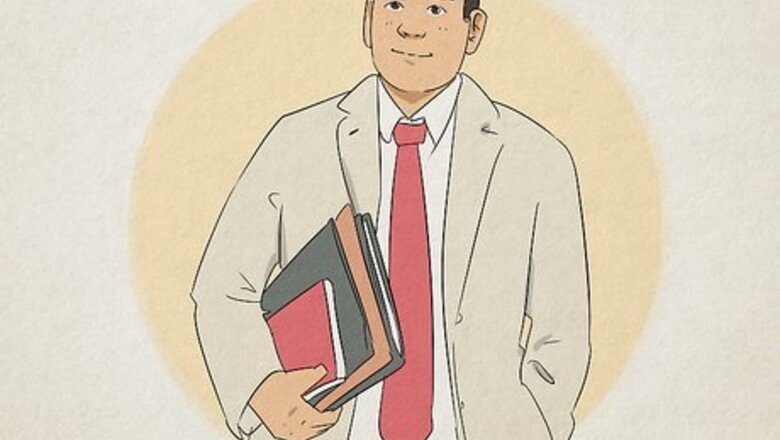
views
Preparing for the Interview
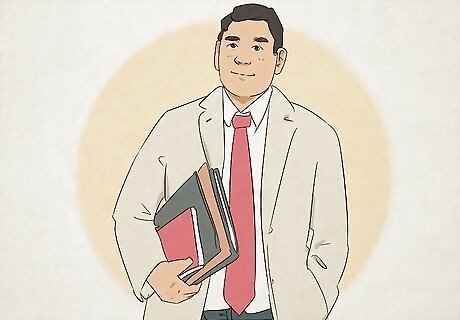
Choose professional attire. First impressions are usually formed within 30 seconds. The first thing an employer will notice is your physical appearance. Pick a wardrobe that communicates effort and professionalism. Research the company's dress code going into the interview. If you know anyone from the company, ask them what's appropriate. You can also call the company's Human Resource Department and ask what is recommended in terms of attire. If you're interviewing for a professional, managerial, or executive position you should always wear a suit. Have a few interview suits, preferably tailored to your body, on hand to choose from. If the attire is business casual, or if you're applying for a lower ranking position, a nice blouse with dress pants or a skirt is a good choice for women. Men can wear dress pants and a button down shirt and tie. If this is for a factory, construction, or other such job where you will get dirty, wear sensible attire to the interview, this includes steel-toed safety shoes and if it's a construction site, you'll need to wear a hard hat (not a bump hat) to get from the gate to the office. Do not forget footwear. Oftentimes, an outfit is great but shoes are tattered or worn. Invest in comfortable, work-appropriate shoes. Do not fret if you have to pay a little more. Remember, you will use these shoes often when you land a job. Avoid perfumes and other fragrances, which can appear tacky and put off interviewers. While accessories, like a nice belt or tasteful jewelry, can be a nice touch avoid anything overly flashy or distracting. If you wear make-up, stick to neutral shades of lipstick, eye-liner, and eye shadow. Your make-up should ideally enhance your existing facial features without overwhelming them.
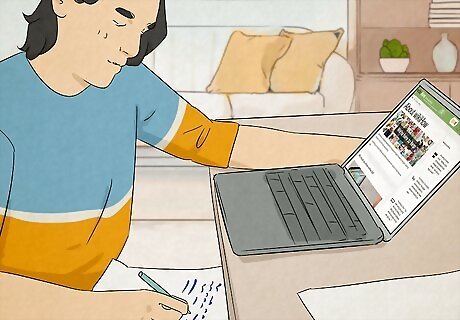
Get educated. Never go into an interview without prior knowledge of the company. This conveys a lack of interest and respect on your part. Conduct thorough research in the days leading up to an interview. Know what skills the company values. Look at the career page on their website and pay close attention to the desired qualifications listed on their job postings. This gives you the opportunity to learn more about a given company and discover what aspects of your skill set and career history to emphasize. Read up on the latest news involving the company. Oftentimes, company websites have a section dedicated to press releases and news coverage. You can also search for the company's name in Google News. Research the company's mission and values. You'll want to make sure you come off as a good fit for the company's culture. There should be a section on the company's website with a mission statement. You can also follow the company on social media to get a sense of their ethos. Find out who your interviewer will be. Oftentimes, this is disclosed in the email asking you to come in for an interview. If not, you can politely request their name. Research the interviewer on LinkedIn and Twitter. This increases your chance of connecting and, in turn, landing the job.
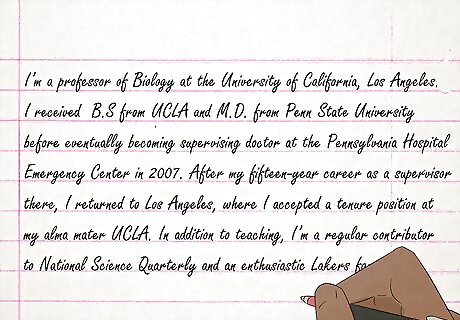
Prepare stories that illustrate your skill-set. Concrete is better than abstract when it comes to wowing an interviewer. You should have a few solid anecdotes prepared that speak to your experience. People tend to remember stories easier than direct information. Therefore, telling a story rather than simply conveying your experience means you'll stand out in an interviewer's mind. Ask yourself, what are the skill sets this company is looking for? Write down a list of skills and, from there, try to come up with stories from past jobs, volunteer experiences, and internships that illustrate your proficiency with said skills. Have 2 to 3 anecdotes to choose from going in. Rehearse. Recite the stories to yourself to make sure you include all necessary information and don't slip up or stutter during the interview. You can always record yourself speaking and play back the recording to see where you need to improve.
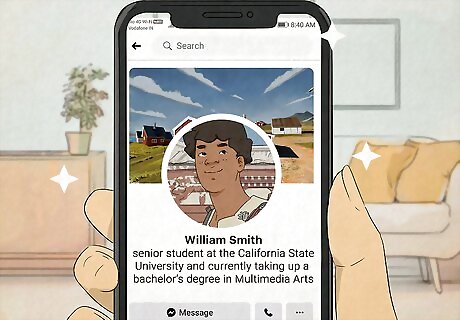
Alter your social media sites. It's not uncommon for employers to scan the Twitter and Facebook accounts of potential employees. Make sure your social media presence is clean before going into an interview. Curse words do not reflect well on you as a potential employee. Make sure any obscenity is removed. A negative attitude can be a deterrent to employment and people often take to Twitter and Facebook to complain. Delete tweets or statues that air grievances about friends, family members, or businesses. If you want to err on the side of caution, you can temporarily deactivate your Facebook or Twitter profile the week before your interview. You can also change privacy settings so only certain posts are visible to the public.
Making the Most of the Initial Introduction
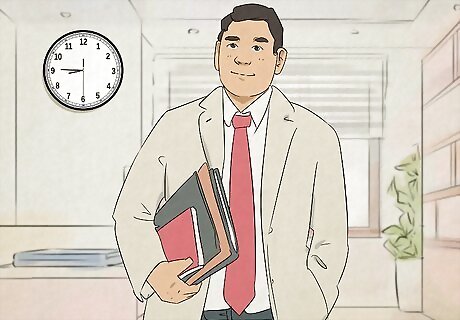
Arrive early. While arriving late to an interview is a major no-no, many people don't realize arriving exactly on time may also reflect poorly on you. Arriving early reflects initiative, drive, and good time management skills. Aim to show up 10 to 15 minutes early, but no earlier than that. Any earlier can put pressure on your interview to conduct the interview prematurely. Stay off your phone while waiting. There's always a chance of receiving distressing information through your smart phone. You don't want anything to take your focus away from the interview. Briefly review any notes you have, but do not go overboard as this can increase your anxiety. Simply scan what you've jotted down. Sit up straight and be attentive. Convey confident body language even while waiting as this will set the tone for your interview.
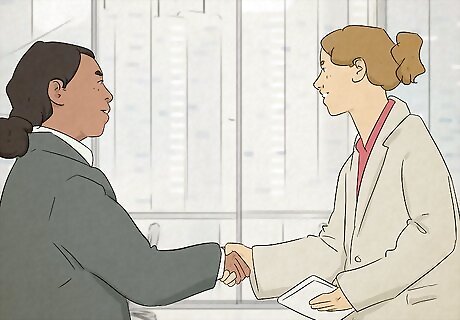
Be friendly to everyone you meet. Your interview starts the moment you enter an establishment. Treat any secretaries or other employees with courtesy as you navigate your way through a place of business. Your interviewer might ask about your behavior afterwards, so be sure to be friendly and engaged with everyone you meet and not just the person conducting the interview.
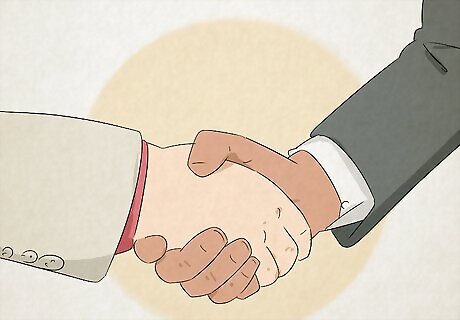
Work on your handshake. A good handshake is vital. This is your first opportunity to impress an interviewer. A handshake should be neither too limp nor too hard. Both methods are off-putting to interviewers. Make sure you arrange your belongings on your left side as you'll be shaking with your right hand. You don't want to leave your interviewer waiting while you fumble with folders and notebooks. Offer your hand with your palm slightly up, allowing the interviewer's hand to cover yours. This is a subtle gesture that conveys respect. Never cover the interviewer's hand with your left hand while shaking. This can be seen as inappropriate and a sing of domination.
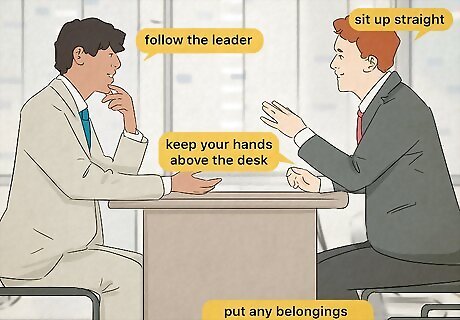
Use effective body language. From the moment you enter the room, use body language that conveys confidence and respect. When you're being lead to the interview, follow the leader. This shows you respect their position of authority over you. Put any belongings, such as a briefcase or purse, on the floor beside you. Holding onto to these items during an interview is awkward and distracting. Placing them on the interviewer's desk can be seen as intrusive. Sit up straight in a manner that displays your neck, chest, and stomach. Do not lean forward. This makes you look nervous or aggressive. Keep your hands above the desk and below your collar bone when gesturing. You don't want to appear overly excited, which can put off your interviewer.
Engaging with the Interviewer
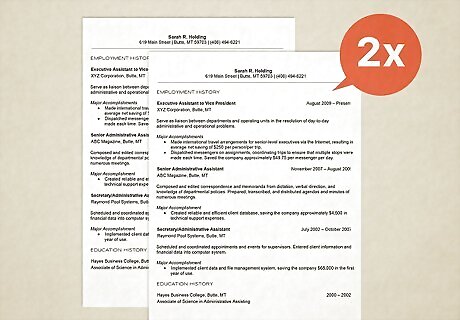
Bring extra copies of your resume. The power of the paper resume still exists in our increasingly digital world. Even if your interviewer does not need an extra copy, they will be impressed you took the initiative to print one out beforehand. Keep your resume in a business folder so it's not tattered or torn when you enter the interview. Having copies on-hand reflects initiative and organizational skills, highly valued traits in job candidates.
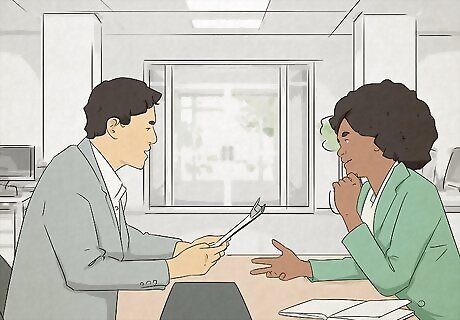
Find ways to be memorable. Remember, you're competing with an onslaught of other applicants for a single job. If you can find appropriate ways to stand out, this could translate to success in landing the position. If there's anything in the interviewer's office that interests you, bring it up. This is especially effective if you have common interests. People are more likely to remember, and hire, people they like. If, for example, you see a picture of your interview riding a horse ask about it, and casually mention you used to take horseback riding lessons as a child. The interviewer will likely ask a general question going in, like "How are you today?" Think of a creative, amusing answer. Instead of saying something like, "Fine" or "I'm good," try using a memorable adjectives like, "Perfect" or "Doing fantastic." You could also create your own answer, relating your mood to something interesting in your day. Like, "Great, actually. The drive over here was so scenic it put me in a fantastic mood." Leave behind a resume or work sample. That way, the interviewer will have a physical reminder of your presence even after you leave.

Avoid certain subjects. Knowing interview etiquette is key to impressing your interviewer, and you should know what subjects are off-limits during an initial evaluation. Never bad-mouth past employees. Whether it’s your prospective employer’s competition or a previous employer, only say positive nice things about others. Interviewers might be wary to trust you if you come off as bitter or a gossip. Do not discuss salary or ask about benefits during the initial interview. While important, these questions should wait. You want to look interested in the position because of a genuine investment in the company rather than monetary gain. Hold off on such questions until you've been hired or moved to another round of interviews. EXPERT TIP Adrian Klaphaak, CPCC Adrian Klaphaak, CPCC Career Coach Adrian Klaphaak is a career coach and founder of A Path That Fits, a mindfulness-based boutique career and life coaching company in the San Francisco Bay Area. He is also an accredited Co-Active Professional Coach (CPCC). Klaphaak has used his training with the Coaches Training Institute, Hakomi Somatic Psychology, and Internal Family Systems Therapy (IFS) to help thousands of people build successful careers and live more purposeful lives. Adrian Klaphaak, CPCC Adrian Klaphaak, CPCC Career Coach Be ready for questions like, 'What is your biggest weakness?' If you're asked about your biggest weakness, share something that isn't core to the function of the job, and try to choose an area where you've already improved. Explain how you've worked to overcome that weakness, and share an example of positive feedback you've recently received.
Ending the Interview

Ask the right questions. You will likely be asked if you have any questions about the position. Many candidates simply say "No" or ask something about logistics (i.e., "When will I hear back?") but this is your opportunity to convey genuine interest in the company. Ask about the company's values and how your work can help further those values. Also, ask about the company's culture. Ask your interviewer what aspects of that culture they find most valuable as an employee. Ask the interviewer if they have any concerns about hiring you. This shows you're willing to adapt to changes and are genuinely invested in self improvement. Ask what an average day of work looks like. This shows that you want to be prepared in the event you get the job. Ask about what opportunities the company provides for collaboration, growth, and education. This shows you're interested in growing as a person and a professional during your employment.

Depart smoothly. Your departure is as important as your arrival, so make sure to exit the interview with grace and class. Gather your belongings calmly. Try not to stumble or drop anything. Shake hands again, following proper protocol. If you can't conveniently shake hands with everyone present, make sure you at least shake hands with the hiring manager. Nod your head as you leave and take the quickest and most convenient route out the door. You may be tempted to try and read your interviewer's body language for signs on how you did, but this can cause undue anxiety. You don't want to engage in any behaviors that can disrupt your confidence.
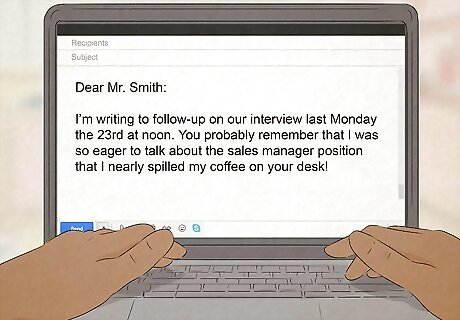
Follow up. In order to convey continued interest, follow up in the days following the interview. As soon as you get home, write down notes from the interview. Include the names of the interviewer and staff you met and specific questions you were asked. Using blank notecards, write a handwritten note to everyone you met. Thank them for the opportunity to interview at their company and mention any specifics you remember about the experience. Emails are often used as a form of follow up, and while this can be great in a pinch aim for a physical note. This sets you apart from other candidates and shows greater effort.



















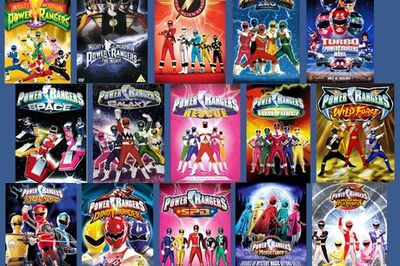
Comments
0 comment